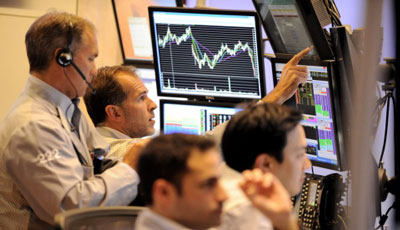Greece Risk May Pose Black Swan Dangers for Emerging Markets

Here we go again. A flight to haven assets has begun as Greece’s economy faces a tailspin, sparking concern defaults and bank collapses could spill over to other European nations, and impose a global impact.
This time, though, Europe and the U.S. confront the risk of contagion with a strengthened policy toolkit — including new mechanisms to monitor and support banks, and a system of swap lines to inject liquidity. In Japan, the central bank is led by a governor who’s already pumping unprecedented monetary stimulus.
If developed markets can regard the risk of Grexit with less trepidation than the maelstrom of 2008, for emerging markets, some of the ground has shifted in an undesired direction. Their combined growth rate is less than half the pace of 2007. Some, including Indonesia and Malaysia, have mounted up on dollar-denominated debt even as their currencies slumped, increasing their vulnerability in a mass exodus from risk.
“Psychologically almost everyone is prepared for some kind of Grexit,” said Andrew Sheng, distinguished fellow at the Fung Global Institute in Hong Kong, who previously worked at the Hong Kong Monetary Authority and Malaysia’s central bank. “What we don’t know is whether there is some unknown black swans out there that nobody figured out.”
Currencies Tumble
Emerging market currencies from the Hungarian forint to Indonesian rupiah retreated in the wake of Greece’s decision to halt bailout talks with European and International Monetary Fund officials. Chinese stocks tumbled even after the People’s Bank of China cut interest rates and eased liquidity constraints over the weekend.
A key event risk for emerging markets will be the Greek referendum on its debt negotiations due to be held on July 5. If voters reject the proposal, the fallout should be limited, analysts at Australia & New Zealand Banking Group Ltd. said in a note. In case of a “no” vote, “we expect to see risk aversion and a negative impact on EM Asian markets, albeit nowhere close to the extent of the Lehman collapse.”
Direct impact from what’s set to be a deepening Greek recession is likely to be limited for distant economies — for example, China’s exports to Greece make up just 0.18 percent of its total. A hit to European growth as a whole would pose a bigger challenge: almost 16 percent of Chinese shipments go to the European Union.
Severe Scenario
In a more severe scenario, where other euro area members such as Italy and Spain get hammered by surging borrowing costs, even global growth leader Asia would be damaged, says Rajiv Biswas, Asia-Pacific chief economist at IHS Global Insight.
“The impact of a Greek exit from the euro zone with significant contagion effects would lower GDP growth in the Asia-Pacific region by 0.3 percent in 2016 — mainly due to the impact effects on trade and turbulence in financial markets,” Biswas said.
Some of the world’s biggest emerging economies from Russia to Brazil are already suffering from falling commodity prices and weak exports. Brazil is facing its worst recession in 25 years and Russia’s economy is hurting from lower oil prices and sanctions imposed over Ukraine. As a group, emerging and developing nations are set to expand about 4.3 percent this year, compared with 8.7 percent in 2007, according to the IMF.
Their struggles escalate the importance of European leaders containing the Greek situation.
Limiting Contagion
“The key issue that will determine the extent and duration of the sell-off” in risk assets globally is the ECB, said Mohamed El-Erian, chief economic adviser at Allianz SE and a Bloomberg View columnist. If the European Central Bank enlarges asset purchases and creates a firewall around peripheral euro members including Spain and Italy, that “can go a very long way in limiting contagion.”
Europe has other backstops as well, including a European Stability Mechanism that began in 2012 as a permanent rescue facility, backed with 80 billion euros ($89 billion) of capital.
In the U.S., the 2010 establishment of the U.S. Financial Stability Oversight Council, led by the Treasury secretary, provided a one-stop shop for systemic monitoring, including nonbanks. The Federal Reserve also has tightened supervision of overnight financing for securities dealers — the tri-party repurchase agreement market.
Europe, Japan
And both the ECB and Bank of Japan are currently conducting large-scale quantitative easing programs, helping underpin economic recoveries.
Asia has bolstered its own defenses, too. Since the region’s 1997-1998 financial crisis, central banks have adopted floating exchange rates and expanded their foreign exchange reserves to deal with market meltdowns. One example: India central bank Governor Raghuram Rajan has built up a record stockpile of about $355 billion.
The region’s buffers were further strengthened after the 2008 financial crisis when a number of central banks established temporary and permanent swap lines with the Fed to be used in the event of a liquidity crisis.
“There are reasons why contagion shouldn’t be as strong as might have been expected a couple of years ago,” said Daniel Martin, senior Asia economist at Capital Economics Asia Ltd. in Singapore. “But still it would be naive to think Greece could leave the euro zone or default and there wouldn’t be any effect.”
Source: Bloomberg – Greece Risk May Pose Black Swan Dangers for Emerging Markets





























